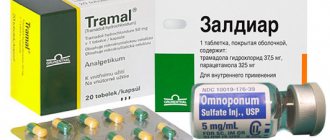Alental 100 mg, 60 film-coated tablets
Registration Certificate Holder
VERTEX (Russia)
Dosage form
Medicine - Alental® (Alental)
Description
Film-coated tablets
white or almost white, round, biconvex; On a cross section, the core is white or almost white.
1 tab.
aceclofenac 100 mg
Excipients
: microcrystalline cellulose - 82.6 mg, croscarmellose sodium - 8.0 mg, povidone K-30 - 6.4 mg, sodium stearyl fumarate - 3.0 mg.
Film shell composition:
[hypromellose - 3.6 mg, talc - 1.2 mg, titanium dioxide - 0.66 mg, macrogol 4000 (polyethylene glycol 4000) - 0.54 mg] or [dry mixture for film coating containing hypromellose 60%, talc 20%, titanium dioxide 11%, macrogol 4000 (polyethylene glycol 4000) 9%] - 6 mg.
20 pcs. — cellular contour packages (1) — cardboard packs. 20 pcs. — cellular contour packages (3) — cardboard packs.
Indications
- relief of inflammation and pain in lumbago, toothache, glenohumeral periarthritis, rheumatic lesions of soft tissues;
- symptomatic treatment of rheumatoid arthritis, osteoarthritis, ankylosing spondylitis;
The drug is intended for symptomatic therapy, reducing pain and inflammation at the time of use, and does not affect the progression of the disease.
Contraindications for use
- erosive and ulcerative lesions of the gastrointestinal tract in the acute phase (including ulcerative colitis, Crohn's disease);
- gastrointestinal bleeding or suspicion of it;
- complete or incomplete combination of bronchial asthma, recurrent polyposis of the nose and paranasal sinuses and intolerance to acetylsalicylic acid or other NSAIDs (including a history);
- severe liver dysfunction or active liver disease;
- disorders of hematopoiesis and coagulation;
- severe renal dysfunction (creatinine clearance <30 ml/min), progressive kidney disease, confirmed hyperkalemia;
- decompensated heart failure;
- period after coronary artery bypass surgery;
- pregnancy;
- lactation period (breastfeeding);
- age under 18 years;
- hypersensitivity to aceclofenac or components of the drug.
Carefully:
history of liver, kidney and gastrointestinal diseases, presence of Helicobacter pylori infection, bronchial asthma, arterial hypertension, decreased blood volume (including immediately after major surgical interventions), coronary artery disease, chronic renal, liver and heart failure, CC <60 ml/ min, history of ulcerative lesions of the gastrointestinal tract, cerebrovascular diseases, dyslipidemia/hyperlipidemia, diabetes mellitus, peripheral arterial diseases, severe somatic diseases, in patients with hemostasis defects, at risk of developing cardiovascular thrombosis (myocardial infarction, acute cerebrovascular accidents (ischemic, hemorrhagic stroke)), systemic lupus erythematosus, long-term use of NSAIDs, simultaneous use of corticosteroids, anticoagulants, antiplatelet agents, serotonin reuptake inhibitors, smoking, alcoholism, old age.
pharmachologic effect
Aceclofenac has anti-inflammatory, analgesic and antipyretic effects. Inhibits the synthesis of prostaglandins and, thus, affects the pathogenesis of inflammation, pain and fever. In rheumatic diseases, the anti-inflammatory and analgesic effect of aceclofenac helps to significantly reduce the severity of pain, morning stiffness, and swelling of the joints, which improves the patient's functional state.
Drug interactions
With the exception of warfarin, no drug interaction studies have been conducted.
Aceclofenac is metabolized by the CYP2C9 isoenzyme; In vitro data indicate that aceclofenac may be an inhibitor of this enzyme. Thus, the risk of pharmacokinetic interaction is possible when taken concomitantly with phenytoin, cimetidine, tolbutamide, phenylbutazone, amiodarone, miconazole and sulfaphenazole.
As with other NSAIDs, the risk of pharmacokinetic interaction with other drugs that are eliminated from the body by active renal secretion, such as methotrexate and lithium, increases.
Aceclofenac is highly bound to plasma albumin and, therefore, there is the possibility of displacement interactions with other protein-bound drugs.
Below is class-specific information for NSAIDs.
Methotrexate:
NSAIDs inhibit tubular secretion of methotrexate; Moreover, a slight metabolic interaction may occur, resulting in decreased methotrexate clearance. Therefore, when using high doses of methotrexate, NSAIDs should be avoided.
Lithium and digoxin:
Some NSAIDs inhibit the renal clearance of lithium and digoxin, resulting in increased plasma concentrations of both substances. Coadministration should be avoided unless lithium and digoxin concentrations are monitored frequently.
Anticoagulants:
NSAIDs inhibit platelet aggregation and damage the gastrointestinal mucosa, which can lead to increased effects of anticoagulants and increase the risk of gastrointestinal bleeding while taking anticoagulants. The combined use of aceclofenac and oral coumarin anticoagulants, ticlopidine and thrombolytics should be avoided unless the patient's condition is carefully monitored.
Antiplatelet agents and selective serotonin reuptake inhibitors
(SSRIs) when used together with NSAIDs may increase the risk of gastrointestinal bleeding.
Cyclosporine, tacrolimus:
When taking NSAIDs concomitantly with cyclosporine or tacrolimus, the risk of increased nephrotoxicity due to decreased renal prostacyclin formation should be taken into account. Therefore, renal function should be carefully monitored during concomitant use.
Other NSAIDs:
When taking acetylsalicylic acid or other NSAIDs simultaneously, the incidence of side effects may increase, so caution should be exercised.
Glucocorticoids:
the risk of ulcers or gastrointestinal bleeding increases.
Diuretics:
aceclofenac, like other NSAIDs, can inhibit the activity of diuretics and may reduce the diuretic effect of furosemide and bumetanide and the antihypertensive effect of thiazides. Co-administration with potassium-sparing diuretics can lead to an increase in potassium levels in the blood plasma. Aceclofenac did not affect blood pressure control when used in combination with bendrofluazide, although interactions with other diuretics cannot be excluded.
Antihypertensive drugs:
NSAIDs may also reduce the effect of antihypertensive drugs. Concomitant use of ACE inhibitors or angiotensin II receptor antagonists and NSAIDs may lead to impaired renal function. The risk of acute renal failure, which is usually reversible, may be increased in some patients with impaired renal function, such as the elderly or those who are dehydrated. Therefore, caution should be exercised when used together with NSAIDs. Patients should consume the required amount of fluid and be under appropriate monitoring (monitoring of renal function at the beginning of co-administration and periodically during treatment).
Hypoglycemic agents:
Clinical studies show that diclofenac can be used in conjunction with oral hypoglycemic agents without affecting their clinical effect. However, there are isolated reports of hypoglycemic and hyperglycemic effects of the drug. Thus, when taking aceclofenac, dosages of drugs that can cause hypoglycemia should be adjusted.
Zidovudine:
When taking NSAIDs and zidovudine concomitantly, the risk of hematological toxicity increases.
There is evidence of an increased risk of hemarthrosis and hematomas in HIV-positive patients with hemophilia receiving zidovudine and ibuprofen. Mifepristone:
Aceclofenac can be used 8-12 days after taking mifepristone. because NSAIDs reduce the effect of drugs in this group.
Cholestyramine:
other medicines, incl. and NSAIDs should be used at least 1 hour before or 4-6 hours after taking cholestyramine to reduce its effect on drug absorption.
Dosage regimen
The drug is taken orally. The tablet should be swallowed whole with plenty of water.
Usually
adults
are prescribed 1 tablet. (100 mg) 2 times/day (morning and evening).
The drug should be taken for the shortest possible period of time. The course of treatment is prescribed by the doctor individually.
Overdose
There is no data on an overdose of aceclofenac in humans.
Possible
symptoms:
nausea, vomiting, pain in the stomach, dizziness, headache, hyperventilation with increased convulsive readiness.
Treatment:
gastric lavage, administration of activated carbon, symptomatic therapy. Forced diuresis and hemodialysis are not effective enough.
Side effect
Classification of the frequency of side effects according to WHO recommendations: very often (>1/10); often (from >1/100 to <1/10); uncommon (>1/1000 to <1/100); rare (>1/10,000 to <1/1000); very rare (<1/10,000, including isolated reports).
From the hematopoietic system:
rarely - anemia; very rarely - bone marrow suppression, granulocytopenia, thrombocytopenia, neutropenia, hemolytic anemia.
From the side of metabolism:
very rarely - hyperkalemia, weight gain.
Allergic reactions:
rarely - anaphylactic reactions, including shock, hypersensitivity.
From the mental side:
very rarely - depression, unusual (atypical) dreams, insomnia.
From the nervous system:
often - dizziness; very rarely - paresthesia, tremor, drowsiness, headache, dysgeusia (taste perversion).
From the side of the organ of vision:
rarely - visual impairment.
From the organ of hearing and labyrinth:
very rarely - vertigo, tinnitus.
From the cardiovascular system:
rarely - heart failure, increased blood pressure; very rarely - tachycardia, skin hyperemia, “hot flashes” (short-term sensation of heat, accompanied by increased sweating), vasculitis.
From the respiratory system:
rarely - shortness of breath; very rarely - bronchospasm.
From the digestive system:
often - dyspepsia, abdominal pain, nausea, diarrhea; uncommon - flatulence, gastritis, constipation, vomiting, ulceration of the oral mucosa; rarely - melena, ulceration of the gastrointestinal mucosa, hemorrhagic diarrhea, hemorrhages of the gastrointestinal mucosa; very rarely - stomatitis, vomiting blood, intestinal perforation, worsening of Crohn's disease and ulcerative colitis, pancreatitis.
From the liver and biliary tract:
often - increased activity of liver enzymes; very rarely - liver damage (including hepatitis), increased alkaline phosphatase activity.
From the skin and subcutaneous tissue:
uncommon - itching, rash, dermatitis, urticaria;
rarely - angioedema; very rarely - purpura, eczema, severe reactions from the skin and mucous membranes (including Stevens-Johnson syndrome and toxic epidermal necrolysis); Serious skin and soft tissue infections have been reported in isolated cases when NSAIDs were taken during chickenpox. From the urinary system:
infrequently - increased concentrations of urea and creatinine in the blood plasma; very rarely - nephrotic syndrome, renal failure, interstitial nephritis.
Other:
very rarely - increased fatigue, muscle spasms of the lower extremities.
special instructions
The simultaneous use of Alental® and other NSAIDs, including selective COX-2 inhibitors, should be avoided.
Adverse events can be minimized by using the lowest effective dose and reducing the duration of treatment needed to control symptoms.
Effect on the gastrointestinal tract
Bleeding, ulcer or perforation of the gastrointestinal tract with a fatal outcome was observed when taking any NSAIDs during any period of treatment, both in the presence of corresponding symptoms and a history of serious gastrointestinal diseases (peptic ulcer of the stomach and duodenum, Crohn's disease, ulcerative colitis and others), and without them.
The risk of bleeding, ulceration, and gastrointestinal perforation increases with increasing doses of NSAIDs in patients with a history of peptic ulcers, especially those accompanied by bleeding or perforation, and in elderly patients. Such patients should be prescribed the minimum effective dose of the drug. Also, when treating these groups of patients and patients who require concomitant use of acetylsalicylic acid in low doses or other drugs that may increase the risk of gastrointestinal complications, the need for combination therapy with protective drugs (for example, misoprostol or proton pump inhibitors) should be considered. ).
Patients with gastrointestinal diseases, incl. elderly should report any unusual gastrointestinal symptoms (especially bleeding), incl. when taking Alental® for the first time. Particular caution should be exercised in patients concomitantly taking drugs that may increase the risk of bleeding or ulceration, such as systemic corticosteroids, anticoagulants (such as warfarin), selective serotonin reuptake inhibitors, or antiplatelet agents (such as acetylsalicylic acid).
If gastrointestinal bleeding or ulcers occur, treatment with Alental® should be discontinued.
Effect on the cardiovascular system and central nervous system
Patients with hypertension and/or mild to moderate congestive heart failure require appropriate monitoring because Taking NSAIDs (particularly in high doses with long-term use) may not significantly increase the risk of arterial thrombosis (for example, myocardial infarction or stroke). There is no reliable data on the absence of this risk when taking aceclofenac.
Patients with uncontrolled arterial hypertension, chronic heart failure, established coronary artery disease, atherosclerosis of peripheral arteries and/or cerebrovascular accident should be careful when taking Alental®. Also, before the first dose, caution should be exercised in patients with risk factors for the cardiovascular system (for example, hypertension, hyperlipidemia, diabetes mellitus, smoking).
Effect on the liver and kidneys
Taking NSAIDs can cause a dose-dependent decrease in prostaglandin formation and acute renal failure. The importance of prostaglandins in maintaining renal blood flow should be considered when taking the drug in patients with impaired cardiac, renal or hepatic function, in patients receiving diuretics or in patients after surgery, as well as in elderly patients.
Caution should be exercised when prescribing the drug to patients with mild or moderate impairment of liver and kidney function, as well as patients with other conditions predisposing to fluid retention in the body. In these patients, NSAIDs may cause renal dysfunction and fluid retention.
Patients taking diuretics and those at increased risk of hypovolemia should also be careful when taking Alental®. It is necessary to prescribe the minimum effective dose and regular medical monitoring of kidney function. Adverse renal events usually resolve after discontinuation of aceclofenac.
Aceclofenac should be discontinued if changes in liver function tests persist or worsen, clinical signs or symptoms of liver disease develop, or other manifestations (eosinophilia, rash) occur. Hepatitis can develop without prodromal symptoms.
The use of NSAIDs in patients with hepatic porphyria may precipitate an attack.
Hypersensitivity and skin reactions
Like other NSAIDs, the drug may cause allergic reactions, including anaphylactic/anaphylactoid reactions, even if the drug is taken for the first time. Severe skin reactions (some of which can be fatal), including exfoliative dermatitis, Stevens-Johnson syndrome and toxic epidermal necrolysis, have been observed very rarely after taking NSAIDs. The highest risk of these reactions occurs during the first month of taking the drug. If skin rash, damage to the oral mucosa or other signs of hypersensitivity occur, you should stop taking Alental®.
In some cases, chickenpox can cause skin and soft tissue infections. At present, the role of NSAIDs in worsening the course of these infections cannot be ruled out. Therefore, you should avoid taking Alental® for chickenpox.
Hematological disorders
Aceclofenac may cause reversible inhibition of platelet aggregation.
Respiratory system disorders
Caution should be exercised when taking the drug Alental® to patients with a history of bronchial asthma or current bronchial asthma, because taking NSAIDs may trigger the development of sudden bronchospasm in such patients.
Elderly patients
Caution should be exercised when taking the drug in elderly patients, because they are more likely to experience side effects (especially bleeding and gastrointestinal perforation) when taking NSAIDs. Complications can be fatal. Older patients are also more likely to suffer from kidney, liver, or cardiovascular diseases.
Long-term use
All patients receiving long-term treatment with NSAIDs should be closely monitored (eg, complete blood count, liver function tests, and renal function tests).
Impact on the ability to drive vehicles and operate machinery.
You should refrain from driving vehicles and engaging in other potentially hazardous activities that require increased concentration and speed of psychomotor reactions, because the drug may cause dizziness and other side effects that may affect these abilities.
Storage conditions
The drug should be stored in a place protected from light and out of reach of children at a temperature not exceeding 25°C.
Best before date
Shelf life: 3 years. Do not use after the expiration date.
Use during pregnancy and breastfeeding
Restrictions during pregnancy - Contraindicated. Restrictions when breastfeeding - Contraindicated.
Pregnancy
Alental® is contraindicated during pregnancy. There is no information on the use of aceclofenac during pregnancy. Inhibition of prostaglandin synthesis may adversely affect the course of pregnancy and/or the development of the embryo/fetus.
In the third trimester of pregnancy, all prostaglandin synthesis inhibitors, having cardiopulmonary toxicity, can cause premature closure of the ductus bollus with the development of pulmonary hypertension, as well as impaired fetal renal function, which can progress to renal failure in combination with polyhydramnios.
Women in late pregnancy and newborns: aceclofenac may affect the duration of bleeding due to the antiplatelet effect, which can develop even after the use of very low doses; aceclofenac may suppress uterine contractions, leading to delayed labor or prolonged labor.
Breast-feeding
Alental® should not be taken during breastfeeding. There are no data on the excretion of aceclofenac in breast milk; When radioactive 14C-aceclofenac was administered to lactating rats, no noticeable transfer of radioactivity into milk was observed.
Fertility
NSAIDs may affect fertility and are not recommended for use by women planning pregnancy.
Use for renal impairment
Restrictions for impaired renal function - With caution.
The use of the drug is contraindicated in patients with severe renal impairment (creatinine clearance <30 ml/min) and progressive kidney disease.
The drug should be used with caution in patients with a history of kidney disease or chronic renal failure.
Use for liver dysfunction
Restrictions for liver dysfunction - With caution.
The use of the drug is contraindicated in patients with severe liver dysfunction or active liver disease.
The drug should be used with caution in patients with a history of liver disease or chronic liver failure.
Use in elderly patients
Restrictions for elderly patients - With caution. Use the drug with caution in elderly patients.
Use in children
Restrictions for children - Contraindicated.
The use of the drug in children and adolescents under 18 years of age is contraindicated.
Terms of sale
The drug is available with a prescription.
Contacts for inquiries
VERTEX JSC (Russia)
199106 St. Petersburg Vasilyevsky Island, 24-liniya, no. 27, lit. A Tel/fax
Alental®
The simultaneous use of Alental® and other NSAIDs should be avoided. including selective cyclooxygenase-2 (COX-2) inhibitors.
Adverse events can be minimized by using the lowest effective dose and reducing the duration of treatment necessary to control symptoms.
Effect on the gastrointestinal tract
Bleeding, ulcers or perforation of the gastrointestinal tract with a fatal outcome were observed when taking any NSAIDs during any period of treatment, both in the presence of corresponding symptoms and a history of serious gastrointestinal diseases (peptic ulcer of the stomach and duodenum, Crohn's disease, ulcerative colitis, etc.), and and without them.
The risk of bleeding, ulceration, and gastrointestinal perforation increases with increasing doses of NSAIDs in patients with a history of peptic ulcers, especially those accompanied by bleeding or perforation, and in elderly patients. These patients should take the minimum effective dose of the drug. They require combination therapy with protective drugs (for example, misoprostol or proton pump inhibitors). Such treatment is necessary for patients who take small doses of acetylsalicylic acid or other drugs that negatively affect the gastrointestinal tract.
Patients with gastrointestinal diseases, including the elderly, should report any unusual gastrointestinal symptoms (especially bleeding), including when initially taking the drug. Particular caution should be exercised in patients concomitantly taking drugs that may increase the risk of bleeding or ulceration, such as systemic corticosteroids, anticoagulants (such as warfarin), selective serotonin reuptake inhibitors, or antiplatelet agents (such as acetylsalicylic acid).
If gastrointestinal bleeding or ulcers occur, treatment with Alental® should be discontinued.
Effects on the cardiovascular and central nervous system
Patients with arterial hypertension and/or mild to moderate congestive heart failure require appropriate monitoring, since taking NSAIDs (particularly in high doses with long-term use) may not significantly increase the risk of arterial thrombosis (for example, myocardial infarction or stroke). There is no reliable data on the absence of this risk when taking aceclofenac.
Patients with uncontrolled arterial hypertension, chronic heart failure, established coronary heart disease, atherosclerosis of peripheral arteries and/or cerebrovascular accident should be careful when taking Alental®. Also, before the first dose, caution should be exercised in patients with risk factors for the cardiovascular system (for example, hypertension, hyperlipidemia, diabetes mellitus, smoking).
Effect on the liver and kidneys
Taking NSAIDs can cause a dose-dependent decrease in prostaglandin formation and acute renal failure. The importance of prostaglandins in maintaining renal blood flow should be considered when taking the drug in patients with impaired cardiac, renal or hepatic function, in patients receiving diuretics or in patients after surgery, as well as in elderly patients.
Caution should be exercised when prescribing the drug to patients with mild or moderate impairment of liver and kidney function, as well as patients with other conditions predisposing to fluid retention in the body. In these patients, NSAIDs may cause renal dysfunction and fluid retention. Patients taking diuretics and those at increased risk of hypovolemia should also be careful when taking Alental®. It is necessary to prescribe the minimum effective dose and regular medical monitoring of night function. Adverse renal events usually resolve after discontinuation of aceclofenac.
Aceclofenac should be discontinued if changes in liver function tests persist or worsen, clinical signs or symptoms of liver disease develop, or other manifestations (eosinophilia, rash) occur. Hepatitis can develop without prodromal symptoms.
The use of NSAIDs in patients with hepatic porphyria may precipitate an attack.
Hypersensitivity and skin reactions
Like other NSAIDs, the drug may cause allergic reactions, including anaphylactic/anaphylactoid reactions, even if the drug is taken for the first time. Severe skin reactions (some of which can be fatal), including exfoliative dermatitis, Stevens-Johnson syndrome and toxic epidermal necrolysis, have been observed very rarely after taking NSAIDs.
The highest risk of these reactions occurs during the first month of taking the drug. If skin rash, damage to the oral mucosa or other signs of hypersensitivity occur, you should stop taking Alental®.
In some cases, chickenpox can cause skin and soft tissue infections.
At present, the role of NSAIDs in worsening the course of these infections cannot be ruled out. Therefore, you should avoid taking Alental® for chickenpox.
Hematological disorders
Aceclofenac may cause reversible inhibition of platelet aggregation.
Respiratory system disorders
Caution should be exercised when taking the drug to patients with a history of bronchial asthma or current bronchial asthma, since taking NSAIDs may trigger the development of sudden bronchospasm in such patients.
Elderly patients
Caution should be exercised when taking the drug in elderly patients, as they are more likely to experience side effects (especially bleeding and perforation of the gastrointestinal tract) when taking NSAIDs. Complications can be fatal. Older patients are also more likely to suffer from kidney, liver, or cardiovascular diseases.
Long-term use
All patients receiving long-term treatment with NSAIDs should be closely monitored (eg, complete blood count, liver function tests, and renal function tests).
Alenthal
Concomitant use of Alental and other NSAIDs, including selective cyclooxygenase-2 (COX-2) inhibitors, should be avoided.
Adverse events can be minimized by using the lowest effective dose and reducing the duration of treatment needed to control symptoms.
Effect on the gastrointestinal tract
Bleeding, ulcers or perforation of the gastrointestinal tract with a fatal outcome were observed when taking any NSAIDs during any period of treatment, both in the presence of corresponding symptoms and a history of serious gastrointestinal diseases (peptic ulcer of the stomach and duodenum, Crohn's disease, ulcerative colitis, etc.), and and without them.
The risk of bleeding, ulceration, and gastrointestinal perforation increases with increasing doses of NSAIDs in patients with a history of peptic ulcers, especially those accompanied by bleeding or perforation, and in elderly patients. Such patients should be prescribed the minimum effective dose of aceclofenac. Also, when treating these groups of patients and patients who require concomitant use of acetylsalicylic acid in low doses or other drugs that may increase the risk of gastrointestinal complications, the need for combination therapy with protective drugs (for example, misoprostol or proton pump inhibitors) should be considered. ).
Patients with gastrointestinal diseases, including elderly patients, should report any unusual gastrointestinal symptoms (especially bleeding), including when initially taking Alental. Particular caution should be exercised in patients concomitantly taking drugs that may increase the risk of bleeding or ulceration, such as systemic corticosteroids, anticoagulants (such as warfarin), selective serotonin reuptake inhibitors, or antiplatelet agents (such as acetylsalicylic acid).
If gastrointestinal bleeding or ulcers occur, treatment with Alental should be discontinued.
Effects on the cardiovascular and central nervous system
Patients with arterial hypertension and/or mild to moderate congestive heart failure require appropriate monitoring, since taking NSAIDs (particularly in high doses with long-term use) may not significantly increase the risk of arterial thrombosis (for example, myocardial infarction or stroke). There is no reliable data on the absence of such a risk when taking aceclofenac.
Patients with uncontrolled arterial hypertension, chronic heart failure, established coronary heart disease, atherosclerosis of peripheral arteries and/or cerebrovascular accident should be careful when taking Alental. Also, before taking the drug for the first time, caution should be exercised in patients with risk factors for the cardiovascular system (for example, hypertension, hyperlipidemia, diabetes mellitus, smoking).
Effect on the liver and kidneys
Taking NSAIDs can cause a dose-dependent decrease in prostaglandin formation and acute renal failure. The importance of prostaglandins in maintaining renal blood flow should be considered when taking Alental in patients with impaired cardiac, renal or hepatic function, in patients receiving diuretics, in patients after surgery, as well as in elderly patients.
Caution should be exercised when prescribing Alental to patients with mild or moderate hepatic and renal dysfunction, as well as to patients with other conditions predisposing to fluid retention in the body. In such patients, NSAIDs can lead to impaired renal function and fluid retention. Patients taking diuretics and those at increased risk of hypovolemia should also be careful when taking the drug. It is necessary to prescribe the minimum effective dose and regular medical monitoring of renal function. Adverse renal events usually resolve after discontinuation of aceclofenac.
Aceclofenac should be discontinued if changes in liver function tests persist or worsen, clinical signs or symptoms of liver disease develop, or other manifestations (eosinophilia, rash) occur. Hepatitis can develop without prodromal symptoms.
The use of NSAIDs in patients with hepatic porphyria may precipitate an attack.
Hypersensitivity and skin reactions
Like other NSAIDs, aceclofenac can cause allergic reactions, including anaphylactic/anaphylactoid reactions, even when taken for the first time. Severe skin reactions (some of which can be fatal), including exfoliative dermatitis, Stevens-Johnson syndrome and toxic epidermal necrolysis, have been observed very rarely after taking NSAIDs. The highest risk of these reactions occurs during the first month of taking aceclofenac. If skin rash, damage to the oral mucosa, or other signs of hypersensitivity occur, you should stop taking Alental.
In some cases, chickenpox can cause skin and soft tissue infections. At present, the role of NSAIDs in worsening the course of these infections cannot be ruled out. Therefore, you should avoid taking Alentalf if you have chickenpox.
Hematological disorders
Aceclofenac may cause reversible inhibition of platelet aggregation.
Respiratory system disorders
Caution should be exercised when taking the drug to patients with a history of bronchial asthma or current bronchial asthma, since taking NSAIDs may trigger the development of sudden bronchospasm in such patients.
Elderly patients
Caution should be exercised when taking Alental in elderly patients, as they are more likely to experience side effects (especially bleeding and gastrointestinal perforation) when taking NSAIDs. Complications can be fatal. Older patients are also more likely to suffer from kidney, liver, or cardiovascular diseases.
Long-term use
All patients receiving long-term treatment with NSAIDs should be closely monitored (eg, complete blood count, liver function tests, and renal function tests).
Impact on the ability to drive vehicles and machinery
You should refrain from driving vehicles and engaging in other potentially hazardous activities that require increased concentration and speed of psychomotor reactions, as the drug may cause dizziness and other side effects that may affect these abilities.




